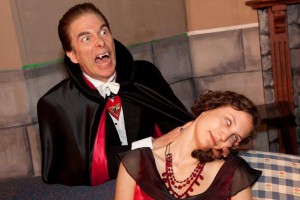russell stover & ivy charles (photo by snap dartmouth)
When I heard that Dartmouth Players was mounting an adaptation of Bram Stoker’s Dracula I was curious why the company decided to have the show close their season in June, rather than opening earlier around the time of Halloween. Part of the answer may be that Ted Tiller’s Count Dracula is far more of a comedy than a horror story, and it does make for a fun and entertaining summer night at the theatre.
Ted Tiller’s 1971 adaptation is a strange and sometimes problematic one. He sets the story in the 1930s, yet he does not do anything to bring the characters into the 20th Century, so Stoker’s exploration of Victorian ideas of femininity and sexuality become anachronistic. Tiller seems to want to turn Dracula into a farce. His addition of Dr. Seward’s dotty sister, Sybil, provides him with most of his farcical exploits, along with the continual exits and entrances of the other characters, who keep saying they want to protect Mina from the vampire, yet continually leave her in vulnerable situations for implausible reasons. The result is that it is difficult for an audience to feel a sense of mounting tension, but since Dracula still presents a real danger (Lucy Westenra was killed by him after all), it doesn’t translate well into the genre of Farce. Thankfully, strong performances from the Dartmouth Players’ cast and a feminist concept from director Tamara Smith elevate this production beyond the limitations of its playwright, which is quite a feat!
My favourite aspect of this play is the choice to change iconic vampire hunter Abraham Van Helsing into Margreet Van Helsing. Stoker’s Dracula captures only a very limited portrait of women and Tiller’s adaptation (sadly) is even more repressive. So, with Smith giving this production a smart, shrewd, strong female protagonist she deftly manages to pull this play into at least the Twentieth Century. In fact, many of the things that make Abraham Van Helsing the stereotype of the brilliant, wildly passionate, somewhat eccentric, foreign professor make Margreet all the more interesting. She is played with a great ferocity of spirit by Valerie Mackenzie with a powerful command of the stage and an unwavering accent.
Other strong performances include a sweet one from Ivy Charles as Mina, delicate, yet with an emerging blood-thirst bubbling below the surface. Cathy Cameron does the best she can with farcical Sybil Seward, trying to balance her loopy silliness, while rooting her in the same world inhabited by everyone else. Mike Taylor makes a dignified Dr. Arthur Seward, which is a nice contrast to the more volatile and panicked Jonathan Harker played by Mathew Tufts. I would have liked for Tufts’ emotional arc to have been a little more defined and with a sense of conflict as the news of Mina potentially being infected by a vampire is revealed. He burst on the scene a nervous, pacing wreck, which left him with nowhere else to go as the circumstances become more dire. Russell Storer gives a beautiful performance as the regal Count Dracula, oozing with charm and relishing in the deliciousness of his wicked, carnal soul. The most mesmerizing performance of the evening was the nimble Brian Fewer as the mental patient, Renfield, whose erratic physicality and vocal timbre reached, at times, cartoon heights and really captured the mixture of farce and horror that Tiller was trying to accomplish with this adaptation.
Andrew Finnigan’s set works well to set the stage for a play that delights in surprising its audience and Tamara Smith makes excellent use of all of its ample spaces to have Dracula emerge with just a touch of magic. The night that I saw this production there was a strange problem with the lights that caused the stage to have frequent, unscheduled 30 second (ish) blackouts throughout the Second Act. While the audience suspected that the blackouts were not intentional, given the nature of the play it was not entirely clear, and thus they became a point of confusion and distraction throughout the act. For future reference, when a technical glitch of that magnitude occurs, it is often in the best interest of the performers to acknowledge it within the world of the play. In this instance, citing trouble with the electricity due to a storm, would immediately set the audience at ease that despite the unforeseeable glitch, the actors were unfazed by the technical difficulties and they can relax and, perhaps be encouraged to laugh at the blackouts rather than become annoyed by them.
In all, I was very impressed with this production of Ted Tiller’s Count Dracula. I look forward to seeing more feminist productions from director Tamara Smith in the future and her cast is filled with many performers who have great promise that I would be excited to see onstage again.






 World Theatre Day: My God Is It Ever The Time to Invest in Canadian Plays
World Theatre Day: My God Is It Ever The Time to Invest in Canadian Plays 